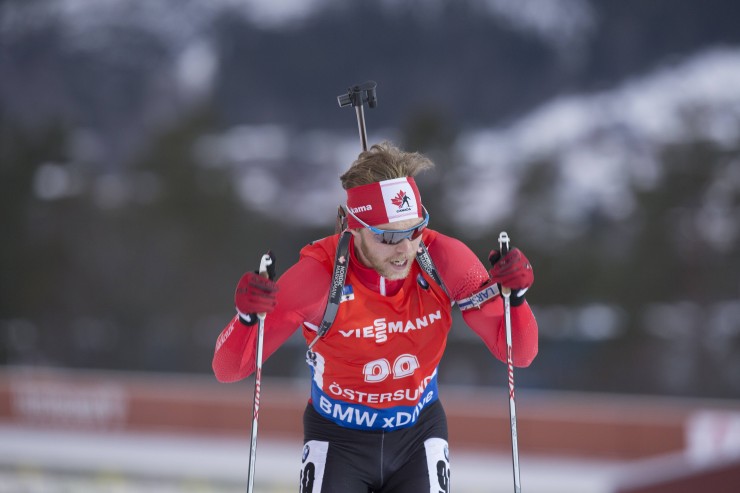
Note: This article has been updated to include additional comments from Macx Davies.
It was a big day for Canadian men in Saturday’s International Biathlon Union (IBU) World Cup sprint in Östersund, Sweden. Two Canadians broke into the top 10, led by Nathan Smith in ninth, with one miss in both standing and prone. He finished 1:22.3 behind France’s Martin Fourcade, who won the 10-kilometer race in 24:02. And 22-year-old Macx Davies had the race of his career so far, finishing 10th, 10.9 seconds after his teammate Smith.
The up-and-coming Canadian biathlete’s previous best was 40th in a World Cup sprint two seasons ago in Oberhof, Germany.
Davies’ secret was simple: be the best shooter of the day. It was windy in Östersund, and he was the only man in the field to shoot clean on Saturday.
How he got to be the best shooter was more complicated. Certainly not by being the fastest — he forgot to load a second clip and had to load each bullet individually in standing.
“That really allowed me to stop thinking about results and focus on hitting every target,” Davies said, according to a Biathlon Canada press release. “I had to push each bullet in by hand, which slowed down my shooting and again forced me to think of each shot more individually than as a whole. It is funny now, but I think this really slowed me down and made me focus more.”
It wasn’t until the last lap that he realized how well he was doing.
“I was the whole Canadian wax crew that was yelling at me on the last lap, and my coach Roddy Ward,” he explained in an email. “I was a little in disbelief at the finish. First of all I was excited to have not lost a position on the last loop. Proving that I can ski with the best guys. And then I just was over the moon after it sunk in that I was 10th!”
Davies cleaned an IBU Cup sprint last season in Obertilliach, Austria. Saturday’s race marked his fifth World Cup.
In an email, Canada’s head coach Matthias Ahrens explained the team aimed to start the season strong “for confidence and also Nation Cup points,” he wrote.
“The first World Cup is always a big question mark due to North America’s isolation during the training year,” he added.
While a strong start was ideal, Ahrens wasn’t expecting this from Davies — at least not right now.
“I did not expect this to happen so early since he had a period of sickness in the last training block, but I know that he is a great skier especially when he switches to snow,” he wrote. “Today everything aligned for him with good skiing and shooting in a challenging race were others had trouble in the shooting range.”
Meanwhile, Smith placing ninth, after he earned silver at 2015 IBU World Championships, was more on par with expectations, Ahrens explained.
Perhaps less surprised with Davies’ performance was Canadian National Team Coach, Roddy Ward.
“Macx can really throw down amazing performances each year. Now he has been given another World Cup opportunity and he has delivered another one of those special performances,” Ward wrote in an email. “He is very dedicated and has belief in himself that he can improve and be among the best. Results like today re-enforce that the effort is paying off.”
“Everything feels surreal at the moment,” Davies said in the press release. “I keep seeing the result sheet and not believing that I’m actually in the top-10. I knew today that good shooting would make a big difference and I felt good on my skis from the start of the race so I really tried to push myself as far as I could go. This result provides me with the confidence that the big names I have idolized growing up are in fact human, and I am competitive with them.”
Another standout performance among North American men belonged to another youngster, 20-year-old American Sean Doherty, who posted a career-best 17th on Wednesday in the 20 k, the first individual World Cup of the season. On Saturday, Doherty placed 25th (+2:13.4). for his second-best result to date, with one penalty in standing and two in prone.
“The sprint today was an interesting race,” Doherty said in a US Biathlon press release. “The wind conditions were very difficult. I felt strong on the course and I am very excited to start the pursuit in the middle of the action. Should be a lot of fun.”
Perennially atop the podium, Fourcade had a commanding victory, finishing 51.6 seconds ahead of second-place Arnd Peiffer of Germany. Crediting fast skis, Fourcade’s victory came in spite of two penalties — one in each stage. But while his competitors tried to wait out the gusting wind on the course, Fourcade shot quickly in order to get the 150-meter penalty loop over with. Peiffer’s clean shooting in prone gave him what he needed to edge Norway’s Ole Einar Bjørndalen, who took third place (+55.2) with two penalties.
Also qualifying for Sunday’s pursuit with a top 60 in the sprint, American Tim Burke placed 45th, (+2:45.8) with four penalties (1+3) and Canada’s Brendan Green was 55th (+3:12.2) with five misses (2+3).
Among the other U.S. finishers, Leif Nordgren placed 64th (+3:39.8) with four penalties (2+2), and Lowell Bailey was 68th (+3:46.7) with six misses (1+6). Canada’s Gow brothers, Scott Gow was 67th (+3:44.5) with five misses (3+2) and Christian Gow placed 70th (+3:49.5) with five missed targets as well (2+3).
Men’s 12.5 k and women’s 10 k pursuits are scheduled for Sunday.



